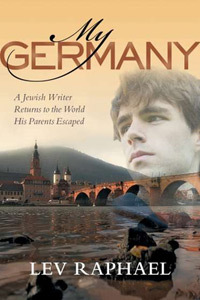I'm just back from a book tour of over two weeks in Germany where I did something I never dreamed of doing: I read from my new memoir in German.
Published so far only in English, My Germany explores the role Germany real and imagined has played in my family, in my life as the son of Holocaust survivors, and in my career as an author.
It was going to be published in Germany first until the publishing house got sold and now book is waiting for a German publisher. But the German translation was finished before the sale, and that made me moderately hopeful when one of the tour organizers asked if I could read in German in three cities in former East Germany. English isn't as widely spoken or understood there as in former West Germany.
I'd already read the prologue in English at over 40 events across North America -- and I'd taken a few German courses -- so this couldn't be too much of a challenge, could it?
To prepare for my tour, I was having German lessons anyway, meeting almost weekly with a woman who was a retired high school German teacher. Petite, tanned, and Viennese, Maria was a friend of friends, had done some translations for me before, and was a good mix of enthusiasm and clarity. My two Westies loved her and they joined us for every session.
Maria and I had already been working on my conversational skills by talking about everything from books to politics to what I had done the previous week. The setting couldn't have been more conducive to learning: the quiet small sun room of my mid-century ranch house looking out over a back yard filled with lilacs, elephant ferns, viburnums, all of it anchored by sassafras trees and a century-old oak tree.
So I sat down with Maria to talk about doing some readings in German, and then I got the bad news. "This is very complicated," she said quietly, the way a doctor might say, "Hmm" looking at a troubling X-Ray. I know German is different from English, but as I explored the German translation with Maria, I slowly realized I was facing a huge challenge.
German syntax presents opportunities for complexity English speakers can't imagine. Here's an example of what we were dealing with. One 24-word English sentence read like this
The bookstore, connected to the Protestant cathedral a block away, is packed before I begin, with at least forty people looking interested and attentive.
In German, it wasn't much longer, but it was very differently structured:
Die dem eine Straße weiter stehenden protestantischen Dom angegliederte Buchhandlung ist bis auf den letzten Platz besetzt, mindestens vierzig Menschen schauen mich interessiert und aufmerksam an, als ich beginne.
The second half of this long sentence isn't too bad or too different from the English, but the first half says, "the one street away-standing Protestant cathedral-connected book store" etc. You can say that in German. I guess. But can you read it aloud? I couldn't.
As we explored further, Maria said, "We have to make this easier for your audience to hear, and for you to say." So we spent time simplifying sentences, simplifying vocabulary, and sometimes just substituting words because I couldn't pronounce certain combinations of sounds together without getting my tongue twisted.
Then I started practicing it by myself almost daily, reading it aloud to her once a week, line-by-line. She explained something that three German classes hadn't taught me: except for questions, the intonation of German sentences drops at the end, it doesn't go up or stay level. How had I watched so many German movies and missed this?
Eventually, I started feeling more comfortable with the German, started slipping inside of the sentences rather than feeling like I was just reciting something unconnected from me. I claimed these words as my own -- and in a sense they are, or at least partly so, a collaboration of me, my tutor, and the translator. The German became so familiar that when I did a reading from the book at a Michigan university two weeks before leaving for Germany, the German phrases kept running through my head as I read the English. It was very strange, but it seemed like a good sign.
What would my Holocaust survivor mother have said about this adventure? I think she would have been proud because her German was perfect, though she rarely spoke it. She expected the best of her children and it's what I always try to give my audience.
I read in big cities and small towns: Berlin, Frankfurt, Magdeburg, Dessau, Halle, Celle and Kirn. Of my nine readings, the three German ones went every bit as well as the English ones. People complimented my accent and my intonation, all of them impressed that I had made the attempt. The summer's work paid off, and everything went without a hitch. Es ist alles glattgegangen.
I've had books of mine translated before, but this is the first time I've entered the translation. Now the book exists for me in a whole new universe.
Lev Raphael's 25th book is the novel of suspense Assault With a Deadly Lie. You can check out his other books on Amazon here.
